Despite condemnations from WHO and health partners, attacks on health care in the Eastern Mediterranean continue with alarming regularity. On World Humanitarian Day, we reiterate our stand with health workers and all people affected by conflict.
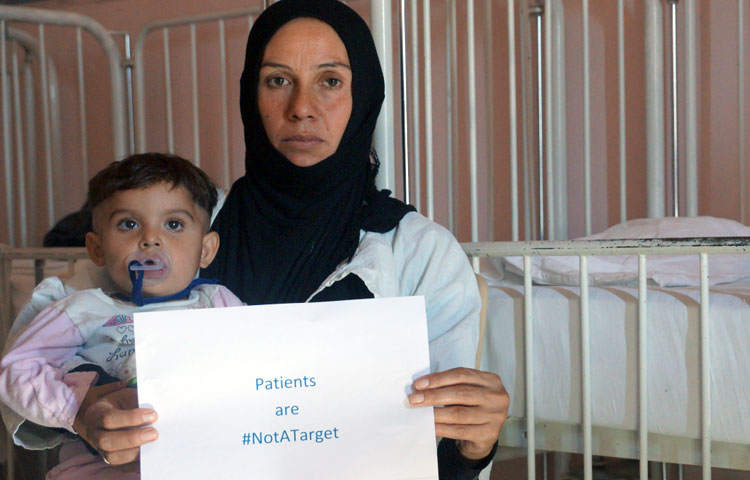
Oum Ali, mother of 5-year old Basma from Ar-Raqqa governorate, Syria, says, “I came from Ar-Raqqa governorate to the children’s hospital in Damascus 1 month ago to seek treatment for Basma, my only daughter who is suffering from a kidney tumour. In addition to the hardships we faced in reaching the hospital, my primary concern is how to secure the costs of my living here while my daughter is being treated.
“My only question to those who destroyed public hospitals in Ar-Raqqa is this: what crime did the critically ill children of Ar-Raqqa commit to be deprived of receiving treatment in their own governorates?”
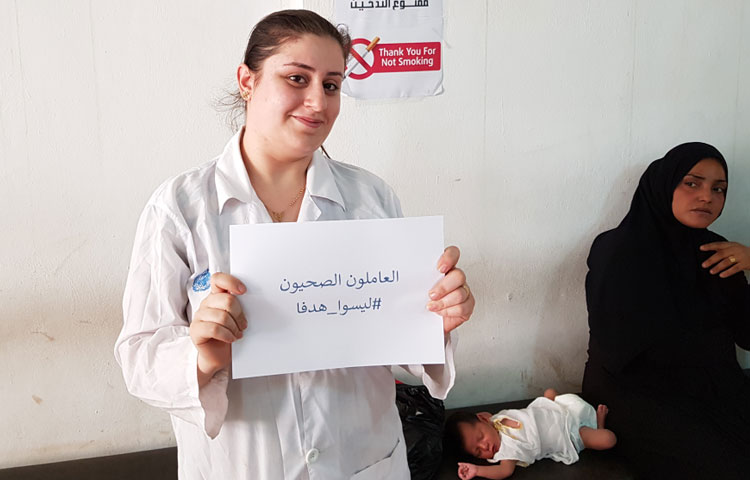
Mishleen Afeh, a nurse at Saint Ephrem Syriac health centre in Al-Hasakah governorate, Syria says: “The fact that many public health facilities are either destroyed or out of service in Al-Hasakah and neighbouring governorates, as well as lack of some specific medicines in Al-Hasakah governorate, has had a very negative impact on the health of patients, especially under the current situation where people’s financial status is ever-deteriorating as a result of the crisis”.
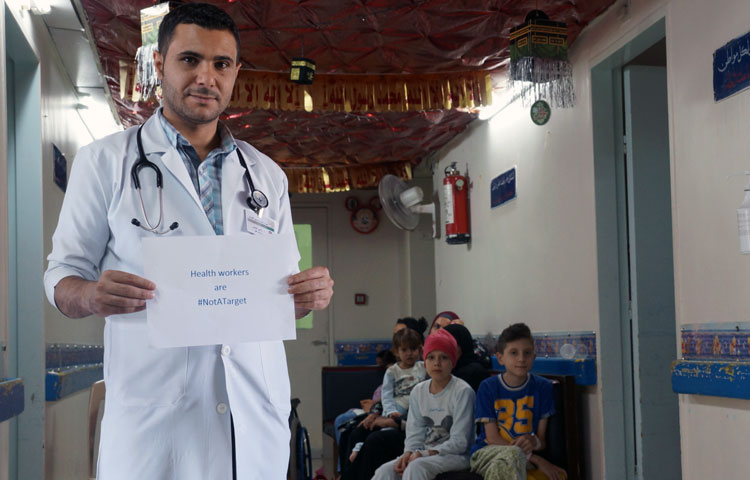
Dr al-Khamis, a paediatric oncologist at the Children’s Hospital in Damascus, has been working with child cancer patients for nearly 3 years. He says that the hospital is struggling to cope with the sheer number of patients seeking health care.
“We are under huge pressure because ours is the only hospital in Syria that focuses exclusively on paediatric care. Health needs are greater than ever due to the devastating effect of the crisis on Syria’s health system”, said Dr al-Khamis. “Hospital staff are working around the clock to treat patients who are coming from all over the country in search of health care. Families from newly accessible areas are also travelling to Damascus to seek help for their children.”
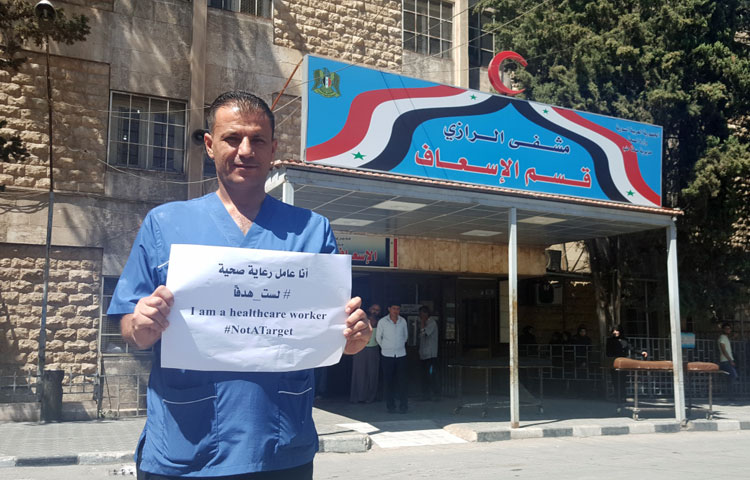
Nurse Waddah Hamdak is the chief nurse in Al-Razi public hospital in Aleppo. He has been working in the Directorate of Health of Aleppo for 28 years.
“In Aleppo, we continue to face many challenges. Many health care centres are closed, and those that remain open are overwhelmed with patients. We are working long hours to help as many patients as possible, including those referred from newly accessible areas”, said Mr Hamdak. “Health care workers often place their own lives at risk simply by coming to work. 8 staff from our hospital were injured following an escalation of violence in the area. However, there is great solidarity among hospital staff. We all look out for each other, and we know that we have the support of our families.”
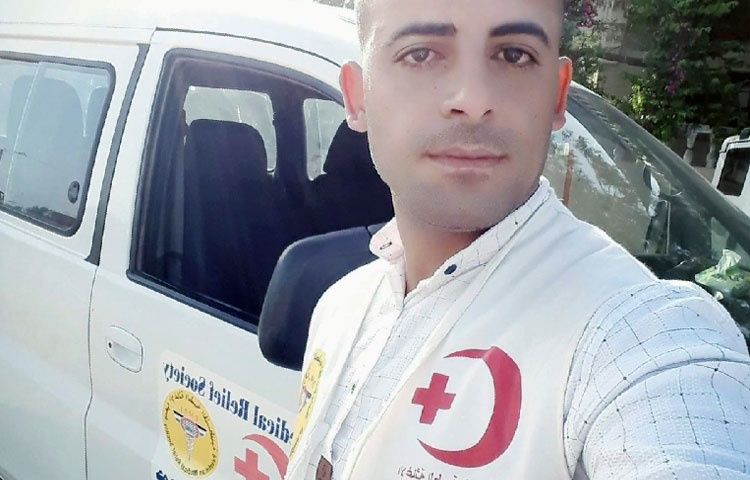
Rami is a 29-year-old volunteer first responder and mental health support worker. He is a refugee who grew up in Khan Yunis in the south of the Gaza Strip.
“Rami joined the Palestinian Medical Relief Society (PMRS) in March 2018 to assist as a first responder during demonstrations that have been taking place in Gaza for the right to return of Palestinian refugees and against the ongoing blockade of the Gaza Strip.”
“We’re affected by too many wars and conflicts, so it’s critical to have people trained to provide immediate care for the injured.”
Rami has been injured 3 times during his volunteering as a first responder since the start of demonstrations on 30 March 2018. On one of these occasions, he was shot with live ammunition during an incident where his colleague Razan was killed. They were working together as part of a team of 5.
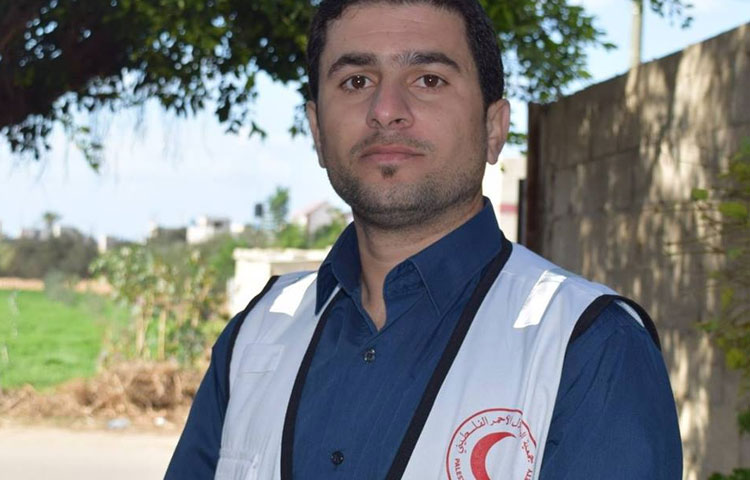
Imad is 34 years old and has been volunteering as a first responder with the Palestinian Red Crescent Society (PRCS) since 2006. He is a refugee who grew up in Deir al-Balah in the Middle Area of the Gaza Strip. Imad volunteered with PRCS to help those injured in demonstrations, until he was injured on 9 April while working as a member of a PRCS team east of al Bureij refugee camp.
“Just after 5 o’clock there was suddenly shooting from the barrier and I was hit in my right leg. We got out of the ambulance straight away and went to hide behind it [on the opposite side from the Gaza barrier]. At this point, the paramedics who were with me put a bandage on my leg to stop the bleeding and moved me to an ambulance and to take me to Al Aqsa Hospital in Deir Al-Balah. I was in Al Aqsa Hospital for about 30 minutes to receive first aid before they moved me to Al-Quds Hospital in Gaza City. From there they transferred me to Shifa Hospital. In Shifa I had surgery. Doctors told me that if I hadn’t been able to have this surgery I would have lost my leg.”
Imad reports that during his 10 years working with PRCS, the teams he has worked with have often been targeted and he himself previously sustained some minor injuries.
After initial surgery, Imad had further operations to remove the bullet and to receive a skin graft.








